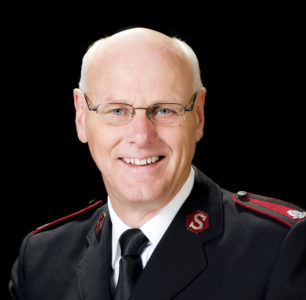Through the Eyes of an Officer: The True Meaning of Easter

By: Major Eric Bond
As a very young child, I remember rising early in the morning and gingerly making my way down the stairs to our kitchen. There my father pointed out something that looked like fur that had been strewn on the floor. He pronounced that he almost caught the Easter bunny but it had escaped his grasp.
For many, the very mention of Easter conjures images of bunnies, Easter egg hunts, chocolate and more chocolate. My wife can remember her and her sisters getting a new Easter outfit. They were all decked out with new straw hats, new dresses, new gloves, new coats and new shoes for Easter Sunday. We have a picture to prove it.
Now as I reflect on Easter, I would say that Easter means an empty tomb. Mark 16:2 says, “Very early on the first day of the week, just after sunrise, they were on their way to the tomb.”
Tombs aren’t exactly on many people’s bucket lists. Tombs are places which are generally foreboding, places of sorrow, hopelessness, sadness and grief. It is a place of death. Tombs are a place of endings. When the disciples came early that first Easter morning to the tomb, everything changed. Everything changed because the stone was rolled away. Why was the stone rolled away?
Was it to allow Jesus to come out? Hardly, for whatever the nature of His resurrection body, the Lord Jesus was independent of doors and indifferent to walls. John 21:19 says, ”On the evening of the first day of the week, when the disciples were together, with the doors locked for fear of the Jews, Jesus came and stood among them and said,” Peace be with you!”
The stone was not rolled away so Jesus could come out but to allow the disciples to go in. The stone was rolled away so that His disciples and all may know that He had risen. That is the meaning of Easter for me. Christ has risen indeed!
In rising from death Christ Jesus has conquered death.
For centuries people have wondered what lies beyond death. Shakespeare described death as, “The undiscovered country, from whose bourn no traveler returns.” In the Old Testament, death was one of the greatest mysteries. Then came Easter Day and the stone was rolled away. The traveler returned. He demonstrated that death was not the end. It wasn’t a deep cavern into which we slipped never to be seen again. Jesus conquered death so that we might also conquer death. Because He lives, we too may live beyond the grave. That is the meaning of Easter for me.
That first Easter resurrection not only has consequences for the afterlife but it has great significance for the present life. His resurrection transforms the tomb from a place of despair, of fear, of end to a place of hope, and new beginnings. We all experience dark and difficult circumstances. We experience loss and sickness, financial difficulties etc. These come to us like the disciples who faced a tomb experience.
For me, the true meaning of Easter is that because Jesus is resurrected, the tomb becomes a place of new beginnings instead of a place of ending. The end becomes the beginning. If we want to end despair, hopelessness, fear and death, we can look to Jesus who has moved from death to life.
For me, Easter means, in Christ, we can find true hope. In Him, we can conquer fear; we can find a new beginning. Jesus said to His disciples in John, 14:19, “Because, I live, you also will live.” We can find life by putting our faith and trust in Him.
This is the meaning of Easter for me.
 Major Eric Bond is the Executive Director of the Grace Communities Corporation at The Salvation Army.
Major Eric Bond is the Executive Director of the Grace Communities Corporation at The Salvation Army.

